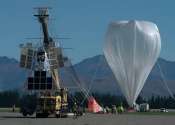Warming of Antarctic deep-sea waters contribute to sea level rise in North Atlantic, study finds
Analysis of mooring observations and hydrographic data suggest the Atlantic Meridional Overturning Circulation deep water limb in the North Atlantic has weakened. Two decades of continual observations provide a greater understanding ...









